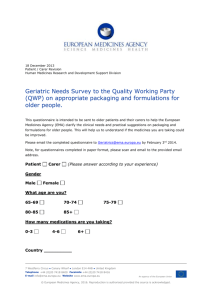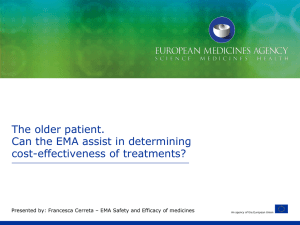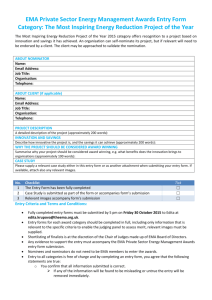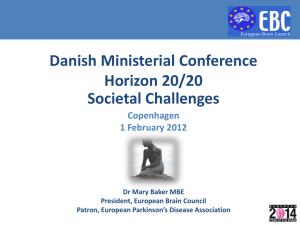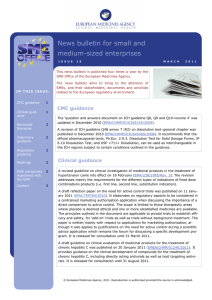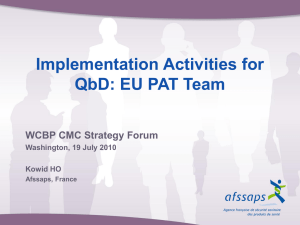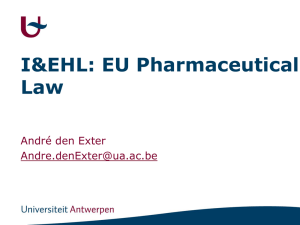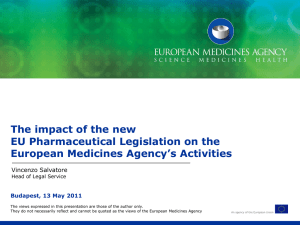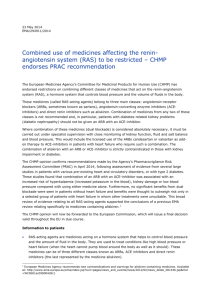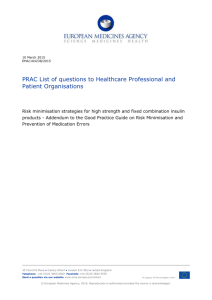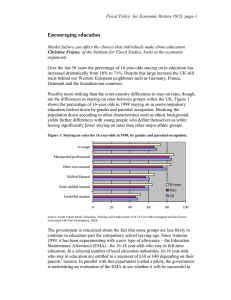EMA Workshop on Medicines for Older People
advertisement
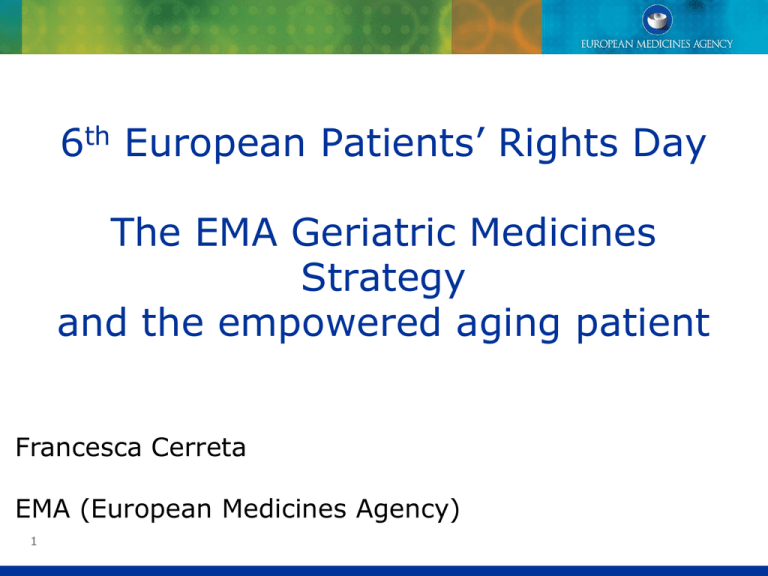
6th European Patients’ Rights Day The EMA Geriatric Medicines Strategy and the empowered aging patient Francesca Cerreta EMA (European Medicines Agency) 1 Marketing Authorisation - Key Principles • The EU is a Single Market for pharmaceuticals approx. 0.5 billion people. • In order to sell a medicinal product in the EU, a company needs a Marketing Authorisation • There are a number of ways ( ‘Procedures’ ) for a company to obtain a marketing authorisation. • The main scientific principle used in the evaluation of medicines is the benefit/risk balance, based mainly on quality, efficacy and safety aspects Centralised Procedure 1 application 1 evaluation 1 authorisation for all EU 1 product information (SPC, Labelling, PL) All EU languages Which medicines are evaluated at the EMA? • Rare diseases (i.e “orphan”) • HIV, cancer, neurodegenerative disorders, diabetes • Auto-immune diseases, viral diseases • All biotechnology products • Gene therapy • Monoclonal antibodies + Other innovative products The importance of patient input for the work of the European Medicines Agency Framework of interaction: principle of patient empowerment • Patient involvement /patient information/ patient safety • Role of patients/consumers’ organisations as multipliers of the interaction (promoting patient safety) Selection criteria for involvement of patients’ organisations • Legitimacy • Mission/objectives • Activities • Representativity • Structure • Accountability and consultation modalities • Transparency Patient involvement in the Agency’s activities: • Patients and Consumers Working Party (PCWP) • Full members of Management Board, COMP (orphan), PDCO (paediatric), CAT (advanced therapies) • Review of product information: -EPAR summaries, package leaflets, safety information Q&A • CHMP (Ad-hoc collaboration): – Input on assessment of products – Experts in scientific advice/protocol assistance – Input in guideline preparation – Observers in Pharmacovigilance Working Party (pilot) • Regular participation in Agency’s workshops and conferences (e.g. Oncology QoL) EMA Vision for a geriatric strategy: TWO PRINCIPLES Medicines used by geriatric patients must be of high quality, and appropriately researched and evaluated.. for use in this population. Improve the availability of information on the use of medicines for older people Evidence based medicine Informed prescription What about the benefit / risk balance in the older population? •Is the benefit/risk demonstrated for the population that will use the product? •Which studies have been carried out? Are they in line with current guidelines? •Can relevant information be found in the EMA approval documents? •What would prescribers, patients and HTA bodies like to know? 10 EMA Geriatric Medicines Strategy - Key points 1. “..ensuring that the development and evaluation of new medicines takes into account specific safety and efficacy aspects related to aging, in accordance with current guidelines, particularly ICH E7” 2. “..identifying gaps in regulatory and scientific knowledge and taking appropriate measures to tackle them” 3. “..consideration for the need of specific pharmacovigilance activities” 4. “..fostering and utilising a relevant experts’ pool to address specific issues as requested by the CHMP.” 11 General Considerations from EMA geriatric workshop 22-23 March •Older people in many cases constitute the main users of a drug, not a special population. •Older adults are underrepresented in clinical trials (relative to disease prevalence) but the situation seems to be improving. •Following ICH E7 Q&A, a representative number of patients should be studied pre-authorisation. •Data should be presented for the entire age spectrum •Population PK should be performed and will help informed prescription Changes to the CHMP Assessment Report •Effective from October 2011 •Aim is to focus the attention of reviewer on geriatric data: – Amount – Context – Missing information •Specific safety and efficacy sections of AR Other Aspects Endpoints - Depending on frailty/disability the desirable outcome and treatment decisions might differ with age Clinical trial recruitment - Make use of existing patients’ networks + CT outcome measures should be relevant to old people Product information-Channels of information are important- specific measures are needed particularly as the older group is non-homogeneous Better focus on Package leaflet: explain how to take medicine/increase compliance/PK and PD changes/concomitant medication Pharmacovigilance: Patient reporting, signal detection; post-authorisation studies. Appropriate formulations? Process Development Formulation Development Drug ? Weighing Manufacturing Drug application High quality pharmaceutical product Added value of involving patients in EMA (1) • Bring a unique and critical input based on their real-life experience of the disease and its current therapeutic environment. • Increase transparency and build confidence and trust in the regulatory process. • Representing patients interests and providing a “patient perspective” view, on behalf of those directly affected by regulatory decisions • Bringing experience of the disease and/or identifying patients with experience of the disease when necessary Added value of involving patients in EMA(2) • Actively contributing to patient information and communication related to medicines. Ensure that patients and patient’s organisations can access to useful and understandable information. • Disseminating committees’ outcomes when they become public; passing on information to other patients and patients’ organisations. • Advising and supporting regulators in its dialogue with industry and other stakeholders when identifying areas of medical need for target research. Thank you! Questions? francesca.cerreta@ema.europa.eu
